
Stixis offers a diversified range of conventional yet professional software development services based on proven methodologies and practices to industry leaders, both large and small.
Our clients hire us to do things better, which is different from hiring someone to do things cheaper, or what they can do themselves if only they had the time. To live up to that standard, we have to know more than anyone else in the market about technology, the science of software engineering, the industries we serve and our client’s business. And we never stop learning.
Enteprise Business Autonomation using Robotic Process Automation (EBPA powered by RPA)
Stixis delivers state-of-the-art Enterprise Business Process Autonomation (EBPA) services and solutions applying Jidoka's RPA technology for the development and orchestration of software robots.
Using a RPA (Robotic Process Automation) approach, Jidoka deploys in companies this new paradigm of "Software Robots", programs that replicate human behaviour using computer applications: reading data and images on a screen, moving the mouse, introducing key commands, etc.
Jidoka Software Robots work on physical computers or virtual machines automating any type of well-defined, repetitive and rule-based tasks, without modifying existing systems and maintaining process activity and error free.
Software Robots
Software Robot technology (also known as RPA or Robotic Process Automation) represents a new paradigm in business process automation. Robots are programs that control other applications to perform repetitive and rule-based tasks. They allow people to focus their efforts on activities that require creativity and cognitive interpretation.
Similar to the manufacturing sector, where robotics revolutionized productivity and quality, Software Robots are transforming the way companies manage their back and front office processes, drastically improving accuracy, speed and efficiency.
Features
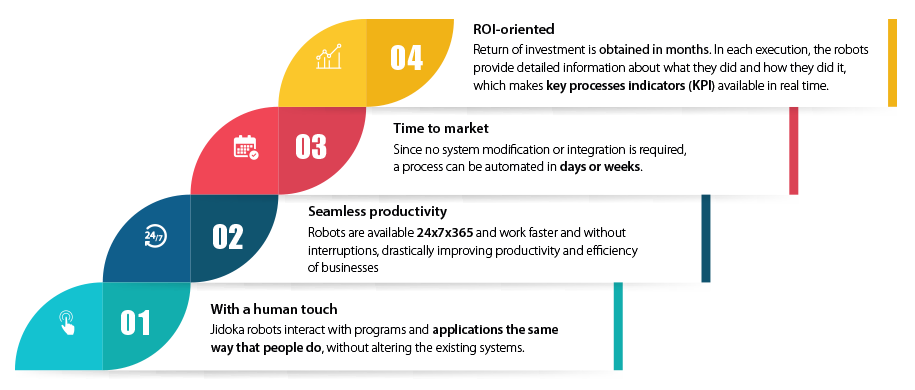
Non-invasive automation
The main difference from the traditional automation lies in its non-invasive nature. Robots do not have direct access to databases, or have to integrate with systems, web services or APIs.
All communications are via user-interfaces or applications windows, in the same way that people do it: moving the mouse, clicking on menus, entering keyboard commands, reading data on a screen.
This new approach of "automating screens" provides the necessary information without modifying the underlying systems. Additionally, it is no longer necessary to understand the technology they use or the data model that supports the applications
Multi-purpose solution
Any repetitive, well-defined process where software and applications are involved, can be run by Jidoka robots.
In their daily strategic processes and operational tasks, companies operate with multiple applications and systems (ERP, CRM, intranets, webs, desktop tools, etc.) that require a high level of manual intervention.
A significant amount of time and resources are invested by companies in tasks that cost a lot of money an add little value, such as managing multiple spreadsheets with information collected from existing systems or "copy-paste" data between applications.
Processes that are stable and well-defined are the best candidates for automation, but not all processes meet these criteria. The objective is not automating 100% of the tasks, but those that are more common, making an analysis of the cost of automation and the benefit that can be obtained.
Our motto is: "Automate whatever is automatable at a competitive price".
Tasks suitable for automation
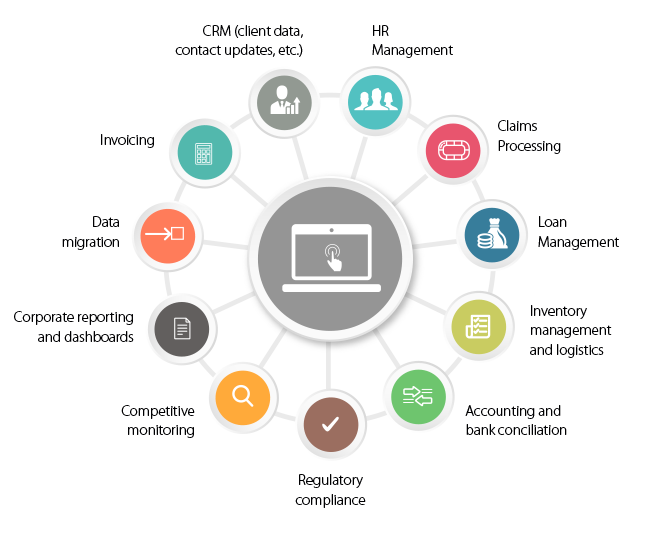
Automated processes
Jidoka Robots replace or reduce manual intervention. They can automate a significant amount of work.
Processes that are stable and well-defined are the best candidates for automation, but not all processes meet these criteria. A key aspect to identify which tasks can be automated with Jidoka is to analyse how the user handles systems, answering questions such as:
» How many times is the process executed?
» How long does it take a person to do it?
» How many applications are involved in the process?
» How many different variables could you find in any task of this process?
» Is it necessary to automate every variable?
Our team of experts have already automated hundreds of processes in several companies from different industries, allowing them to achieve a broader vision of what can or cannot be automated. Our consultants will help you answer key questions and analyze your business needs to define the best automation strategy for your company.
Input - Jidoka - Output
Automation allows you to run multiple processes, using only applications that are already installed on computers, without costly investments in hardware or IT infrastructure.
Robots are available for different systems, such as:
» Host (terminal 3270), Client/Server (Win32/64)
» SAP & Siebel (different versions)
» Web (HTML) & Adobe Flash
» Databases (Access, MySQL, Oracle)
» Input / output formats (ASCII, PDF, Excel, Word)
The key to our approach is reading a huge amount of information (input) from one or more applications, processing it with Jidoka robots applying predefined rules and returning it in a adequate format suitable for further analysis, or even introducing data in other systems (output).
www.jidoka.io, did not happen by chance. It represents the input-output approach that every robot must apply.
Approach
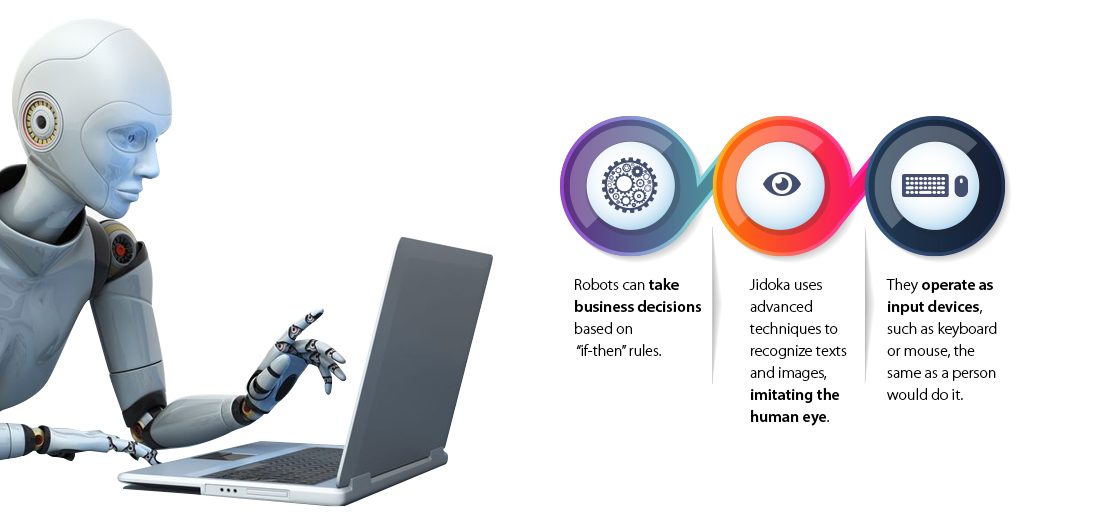
Methodology
To deploy automation we apply an iterative and incremental approach based on "quick-wins". We help our client to identify a catalogue of processes that can be automated and select those that can provide greater value at a lower cost of development and deployment.
Once a process is selected for automation, it is functionally analysed, the robots are developed and tested, and all issues are resolved. Finally, we deploy the automated process and measure its results.
After implementing the robot, the next process to be automated is selected, always seeking to maximize the return on investment (ROI).
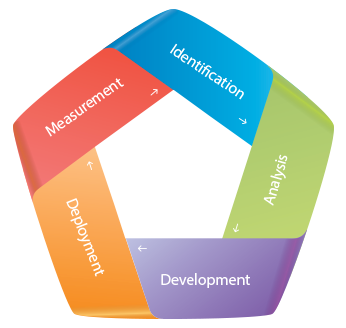
Benefits

Cost Reduction
Robots perform the tasks of human agents at a significantly lower cost.

Increase Productivity
Robots can work 24×7 with no pauses, executing the same tasks as a human team and without interruptions.

Scalability
Thanks to the cloud and virtualized operations, you can scale your automation capabilities based on your demand. You can also use Jidoka Robots on physical PCs, there is no limitation.

Quality and Accuracy
Human errors are reduced. Tasks increase in quality and accuracy, a factor that is critical in most processes (claims, billing, etc.).

Audits and Metrics
In each execution, the robots provide detailed information about what they did and how they did it, which makes key processes indicators (KPI) available in real time.

Security
Robots works under the strictest security protocols, using encrypted communications (SSL), protecting resources with restricted profiles and permissions.
Virtualization to size up your workforce
By delegating some of your tasks to robots, you will be able to manage spikes in activities simply running some extra robots. No more investment in training, and no learning curve: train your robots to be productive from their initial set-up.
Software Robots to boost talent
Jidoka frees up people from monotonous and error prone tasks so they can dedicate to more value-added and creative job.
Jidoka reduces errors that depend on the manual execution of repetitive tasks. It is an excellent tool for staff retention. Your employees will not have to do demotivating tasks any more!
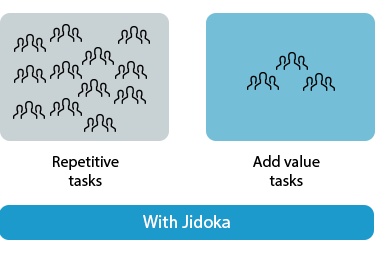
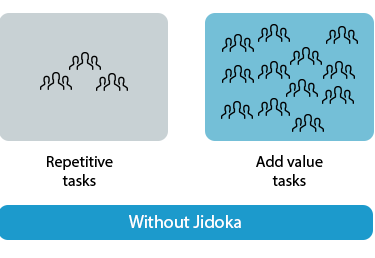
Process improvement
Jidoka is more than a robot doing tasks it allows people to dedicate their time to more value-added work. The process itself evolves and improves as a result of being executed in a more accurate, reliable and predictable way.
Full privacy
Robots do not "understand" information thus they can have access to confidential data (medical records, bank accounts, etc.), ensuring that privacy will be respected at all times.